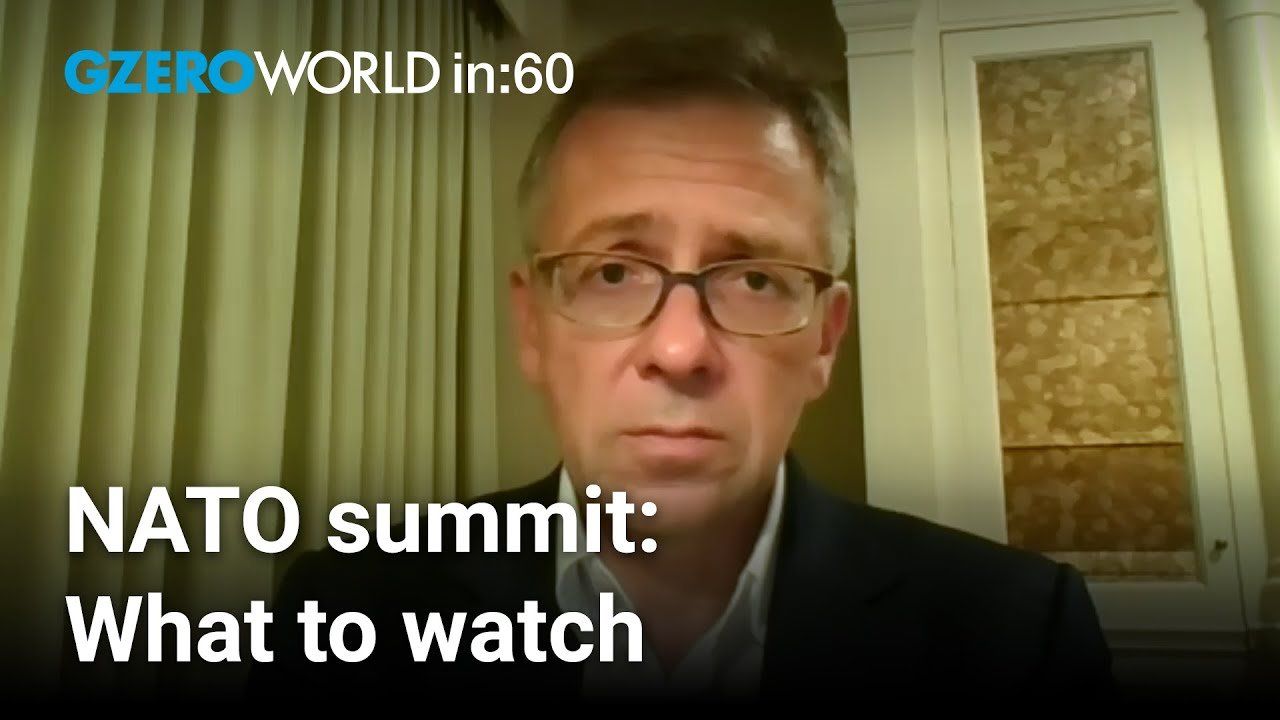Ian Bremmer shares his insights on global politics this week on World In :60.
What are you watching for at the NATO summit?
Well, first and foremost, it's how all of these allies are responding to a very real political crisis in the United States. US, of course, the country they rely on for leading NATO, by far the biggest military power in the world, their principal ally. And they now know that the likelihood that Biden is going to be able to win, is a lot lower than it was the last time they saw him. And they've been seeing him. They saw him at the G7. They saw him in Normandy. They saw him, you know, at the United Nations and some in bunch of bilats and and everyone I've spoken to, says that they're not all confident that he can win. They certainly don't think he can serve out four more years. And they're deeply worried, especially because what a Trump administration might mean for them, with the exception of Viktor Orbán, almost all the NATO allies are very worried. They know that NATO, the EU, the war in Ukraine, all of that much more uncertain if Trump were to come back as president. So that's what I'm watching for and see how that plays out.
How will the UK's new PM, Keir Starmer, lead Britain?
Economically, not all that different. He's focused unusually for labor, focused on a pro-growth policy. He's promised that he isn't going to raise the major taxes like income tax and VAT. And so, he will probably find some more money in things like inheritance tax, he’s going to try to get more private sector investment into the economy. Certainly, wants to have a consistent policy on Ukraine, consistent policy on the United States as the previous conservative governments. Big change will be tried to reestablish stronger relations with the European Union and particularly Ursula von der Leyen, expected to get the nod for another five years running the EU. Keir Starmer spent a lot of personal time working on that over the past months.
As a Russian missile struck a children's hospital in Kyiv is there still no end in sight for the war in Ukraine?
No, no, there's no end in sight. in fact, while that was happening, Narendra Modi, the Indian PM was being quite friendly in Moscow on his visit with Putin. This is a partner of the United States. Putin feels like right now, especially if Trump is elected that his bet on this invasion in Ukraine will work out well for him. And that is not what NATO allies want Putin to be thinking right now. There's been success in getting them a lot of support, the Ukrainians, over the course of the last six months, and certainly they're going to have more money over the next year. But longer term, there's a huge question about how that plays out. And Putin is showing impunity right at the beginning of the NATO summit by sending all those missiles at civilian targets, including sick kids in Ukraine. Not a surprise. but still pretty sickening.
- UK's new PM Starmer aims for closer EU ties ›
- Who is Keir Starmer? ›
- Ukraine will define the future of NATO ›
- How Erdogan won the NATO Summit ›
- Senator Mark Kelly on President Biden's future in the 2024 race and fitness for office - GZERO Media ›
- Ian Explains: Why Biden is the focus of the NATO Summit - GZERO Media ›
- At NATO Summit, Polish FM Radek Sikorski weighs in on Ukraine war - GZERO Media ›
- Ukraine can still win this war, says Poland's FM - GZERO Media ›
More For You
Most Popular
Will AI change the balance of power in the world? At the 2026 World Economic Forum in Davos, Ian Bremmer addresses how artificial intelligence could redefine global politics, human behavior, and societal stability.
Ian Bremmer sits down with Finland’s President Alexander Stubb and the IMF’s Kristalina Georgieva on the sidelines of the World Economic Forum to discuss President Trump’s Greenland threats, the state of the global economy, and the future of the transatlantic relationship.
GZERO World heads to the World Economic Forum in Davos, where Ian Bremmer lookst at how President Trump’s second term is rattling Europe, reshaping both transatlantic relations and the global economy, with Finland’s President Alexander Stubb and the IMF’s Kristalina Georgieva.
